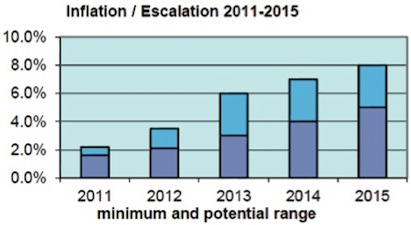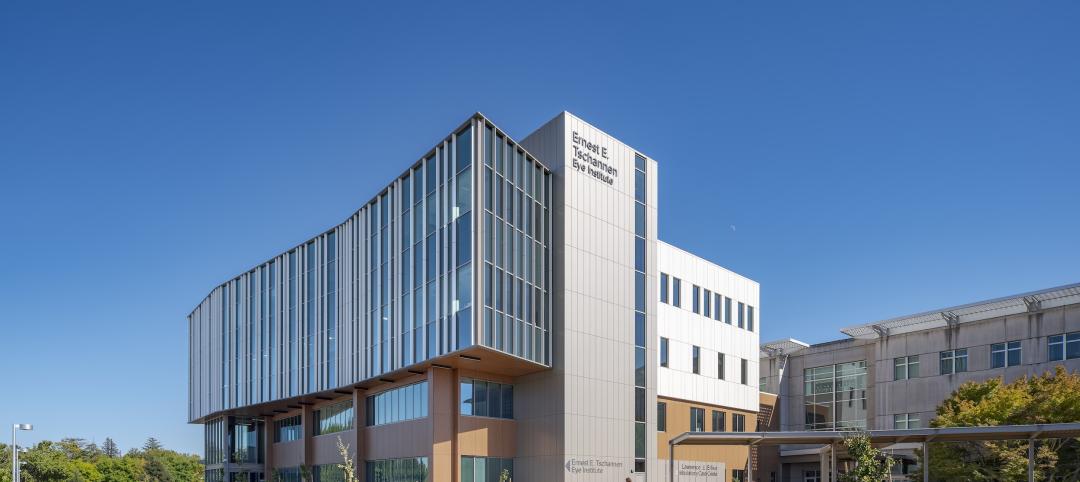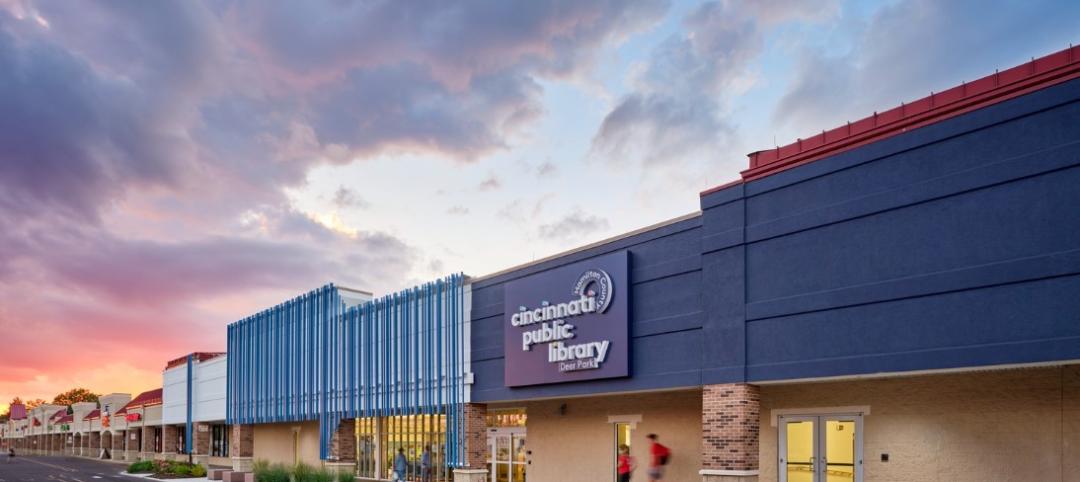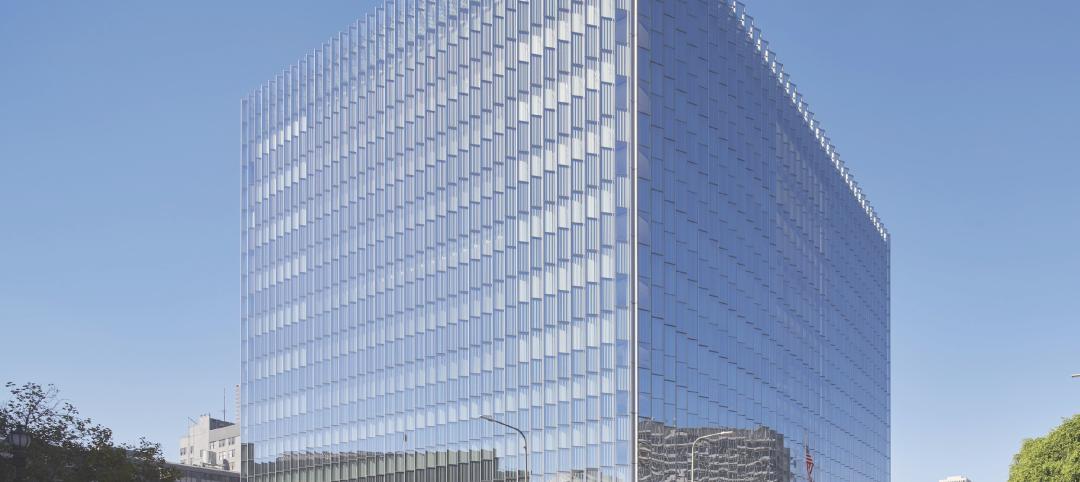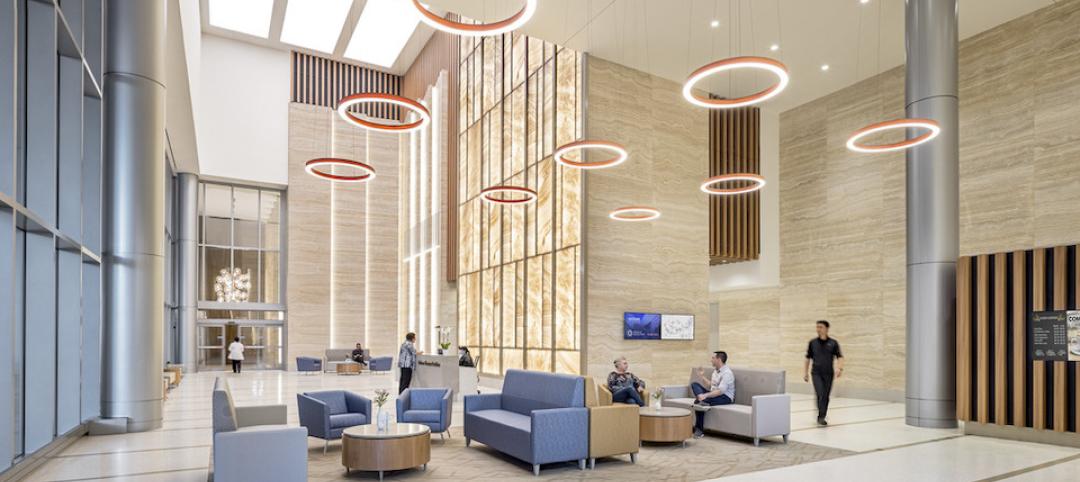??Construction growth is looking up, according to the Winter 2013 release of the periodic report Construction Economics, authored by Gilbane Building Company. Construction spending for 2013 will finish the year 5% higher than 2012. All of the growth will be attributed to residential construction. However, the Dodge Momentum Index, a leading indicator, is up more than 20% since January 2013, indicating growth in 2014. ??
The Architecture Billings Index (ABI) dropped below 50 in April, briefly indicating declining workload. Through September, we’ve seen five more months of growth, a good leading indicator for future new construction work. In October we’ve just had another drop, but not below 50, indicating slower gains rather than declines.
??ENR published selling price data for 2013 that shows contractors adding to their margins.
Some economic factors are still negative:
- ??The monthly rate of spending for nonbuilding infrastructure may climb from September through January, but then may decline by 10% through 2014. ??An anticipated decline in spending from February to May 2014 is influenced only mildly by a slight dip in nonresidential buildings and a flattening in residential but is influenced strongly by a steep decline in nonbuilding infrastructure spending.
- ??The construction workforce is still 25% below the peak. It will take a minimum of four more years to return to peak levels.
- ??As workload expands in the next few years, a shortage of available skilled workers may have a detrimental effect on cost, productivity, and the ability to readily increase construction volume.
Impact of recent events:
- ??FMI’s Third Quarter 2013 Construction Outlook Report mentions a few reasons why spending is not rapidly increasing: the decline in public construction as sequestration continues; lenders are still tight with lending criteria and consumers are still cautious about increasing debt load, and that includes the consumers’share of public debt.
- ??Comments regarding the outlook for economic stimulus have recently caused interest rates to increase rapidly. Lending criteria is still tight and borrowers are cautious about taking on new debt. Rates will continue to rise and borrowing costs will add potential cost to future funding of projects. The cheapest time to build is now behind us.
- ??Construction jobs growth has slowed. Jobs grew by 90,000 in the first half of 2013, but have grown by only 33,000 since June.
The impacts of growth:
- ??Construction spending during the first five months of 2013 declined from the rate of spending in Q4 2012. Growth has been inconsistent, even in the booming residential sector, which has seen recent declines. We see more consistent growth in 2014 for buildings.
- ??As spending continues to increase, contractors gain more ability to pass along costs and increase margins. The growth in contractor margins slowed since last year. However, expected increases in volume should reverse that in 2014.
- ??ENR’s Third Quarter 2013 Cost Report shows general purpose and material cost indices up on average about 2% to 2.5% year over year. However, selling price indices are up on average 4%. The difference between these indices is increased margins.
Supported by overall positive growth trends for the year 2013, expect margins and overall escalation to climb more rapidly than we have seen in five years.
Nonresidential buildings construction slowed in the first five months but is expected to increase substantially in the last few months of 2013. We will see a decline in nonbuilding infrastructure extend completely through 2014. Residential work will remain extremely active. Once growth in nonresidential construction picks up, and both residential and nonresidential are active, we will begin to see more significant labor shortages and productivity losses. Margins regained a positive footing in 2012 and extended those gains in 2013. Expect margins to grow stronger in 2014. Even moderate growth in activity will allow contractors to pass along more material costs and increase margins. When activity picks up in all sectors, escalation will begin to advance rapidly.
Click here for the full report.
About Gilbane
Gilbane Inc. is a full service construction and real estate development company, composed of Gilbane Building Company and Gilbane Development Company. The company (www.gilbaneco.com) is one of the nation’s largest construction and program managers providing a full slate of facilities related services for clients in education, healthcare, life sciences, mission critical, corporate, sports and recreation, criminal justice, public and aviation markets. Gilbane has more than 50 offices worldwide, with its corporate office located in Providence, Rhode Island. The information in this report is not specific to any one region.
Author Ed Zarenski, a 40-year construction veteran and a member of the Gilbane team for more than 33 years, is an Estimating Executive who has managed multimillion dollar project budgeting, owner capital plan cost control, value engineering and life cycle cost analysis. He compiles economic information and provides data analysis and opinion for this quarterly report.
Related Stories
Warehouses | Mar 29, 2023
Construction completed on Canada’s first multi-story distribution center
Construction was recently completed on Canada’s first major multi-story industrial project, a distribution center in Burnaby, British Columbia. The project provides infrastructure for last-mile delivery in a world where consumers have come to expect next-day and same-day delivery, according to Ware Malcomb, the project's architect of record.
AEC Innovators | Mar 27, 2023
Leading architecture, engineering firm HED appoints new co-CEOs
As children of immigrant families, Van Herle and Suarez will bring a diverse perspective into a historically underrepresented industry and advance the firm’s mission of creating a positive impact for clients, communities, and the world.
Healthcare Facilities | Mar 26, 2023
UC Davis Health opens new eye institute building for eye care, research, and training
UC Davis Health recently marked the opening of the new Ernest E. Tschannen Eye Institute Building and the expansion of the Ambulatory Care Center (ACC). Located in Sacramento, Calif., the Eye Center provides eye care, vision research, and training for specialists and investigators. With the new building, the Eye Center’s vision scientists can increase capacity for clinical trials by 50%.
Libraries | Mar 26, 2023
An abandoned T.J. Maxx is transformed into a new public library in Cincinnati
What was once an abandoned T.J. Maxx store in a shopping center is now a vibrant, inviting public library. The Cincinnati & Hamilton County Public Library (CHPL) has transformed the ghost store into the new Deer Park Library, designed by GBBN.
Multifamily Housing | Mar 24, 2023
Multifamily developers offering new car-free projects in car-centric cities
Cities in the South and Southwest have eased zoning rules with parking space mandates in recent years to allow developers to build new housing with less parking.
Multifamily Housing | Mar 24, 2023
Coastal multifamily developers, owners expect huge jump in insurance costs
In Texas and Florida, where Hurricane Ian caused $50 billion in damage last year, insurance costs are nearly 50% higher than in 2022.
Multifamily Housing | Mar 24, 2023
Average size of new apartments dropped sharply in 2022
The average size of new apartments in 2022 dropped sharply in 2022, as tracked by RentCafe. Across the U.S., the average new apartment size was 887 sf, down 30 sf from 2021, which was the largest year-over-year decrease.
Government Buildings | Mar 24, 2023
19 federal buildings named GSA Design Awards winners
After a six-year hiatus, the U.S. General Services Administration late last year resumed its esteemed GSA Design Awards program. In all, 19 federal building projects nationwide were honored with 2022 GSA Design Awards, eight with Honor Awards and 11 with Citations.
Transportation & Parking Facilities | Mar 23, 2023
Amsterdam debuts underwater bicycle parking facility that can accommodate over 4,000 bikes
In February, Amsterdam saw the opening of a new underwater bicycle parking facility. Located in the heart of the city—next to Amsterdam Central Station and under the river IJ (Amsterdam’s waterfront)—the facility, dubbed IJboulevard, has parking spots for over 4,000 bicycles, freeing up space on the street.
Healthcare Facilities | Mar 22, 2023
New Jersey’s new surgical tower features state’s first intraoperative MRI system
Hackensack (N.J.) University Medical Center recently opened its 530,000-sf Helena Theurer Pavilion, a nine-story surgical and intensive care tower designed by RSC Architects and Page. The county’s first hospital, Hackensack University Medical Center, a 781-bed nonprofit teaching and research hospital, was founded in 1888.


